

We have already seen that the + operatior is used to add to numbers.
#include <iostream>
using namespace std;
int main() {
int x = 5;
int y = 7;
int z = x + y;
cout << "The added result is : " << z;
return 0;
}
That was quite easy.
Now, let us say, we have a class that has an integer value. And we want to create two objects and add them.
Let me make it a little simpler with the below example.
#include <iostream>
using namespace std;
class MyClass
{
int x;
public:
MyClass()
{
}
MyClass(int temp)
{
x = temp;
}
};
int main() {
MyClass obj1(5);
MyClass obj2(7);
MyClass obj3 = obj1 + obj2;
cout << "The added result " << obj3;
return 0;
}
So, in the above code, we have created a class named MyClass that has an attribute named x. And we have defined a Constructor that initialises the attribute x.
class MyClass
{
int x;
public:
MyClass()
{
}
MyClass(int temp)
{
x = temp;
}
};Then we have created an object obj1 of the class MyClass.
MyClass obj1(5);
And initialised the value of x with 5(For object obj1).
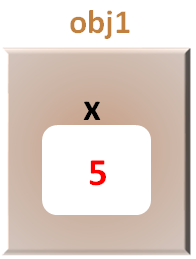
Similarly, we have created a second object obj2.
var obj2 = new MyClass(7);
And initialised the value of x with 7(For object obj2).
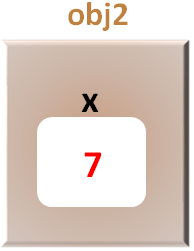
Now, we tried to add two objects obj1 and obj2. Just to add 5 and 7.
MyClass obj2(7);
But we end up with the below error,
error: no match for operator+ (operand types are MyClass and MyClass)
This is because C++ is confused that how can adding two objects add their values?
With this we come to the concept of Overloading the operators. i.e. We will make the + operator act the way, we want it to act.
Let us modify the above example.
#include <iostream>
using namespace std;
class MyClass
{
int x;
public:
MyClass()
{
}
MyClass(int temp)
{
x = temp;
}
MyClass operator + (MyClass myClass1)
{
MyClass myClass;
myClass.x = x + myClass1.x;
return myClass;
}
void showResult()
{
cout << "The added result is : " << x;
}
};
int main() {
MyClass obj1(5);
MyClass obj2(7);
MyClass obj3 = obj1 + obj2;
obj3.showResult();
return 0;
}
And all we have done is, defined a method called public static MyClass operator + (MyClass myClass1, MyClass myClass2).
MyClass operator + (MyClass myClass1)
{
MyClass myClass;
myClass.x = x + myClass1.x;
return myClass;
}This operator + is already defined by C++. When we specify operator before the + sign. C++ understands, the + needs to be Overloaded.
And all we are doing is, redefining the + sign. So that it works exactly the way we want it to work.
So, the MyClass operator + (MyClass myClass1) has a parameter, MyClass myClass1.
Now, the operator + method gets called when the below statement executes.
MyClass obj3 = obj1 + obj2;
And what happens is, the value of the object, obj1 is assigned to the current object and obj2 is assigned to obj.

And right now, current object has the contents of obj1,
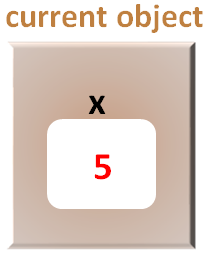
And obj has the contents of obj2,
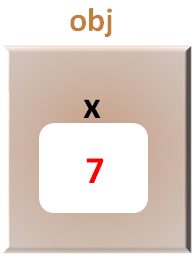
Now, since, the operator + (MyClass myClass1) method has the contents,
MyClass operator + (MyClass myClass1)
{
MyClass myClass;
myClass.x = x + myClass1.x;
return myClass;
}The next statement,
myClass.x = x + myClass1.x;
Adds the value of x i.e. 5 and obj.x i.e. 7.
And the added value is returned,
return myClass;
To obj3,
MyClass obj3 = obj1 + obj2
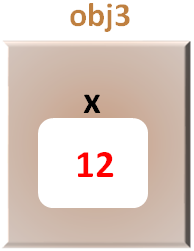
So, the next statement calls the method showResult,
obj3.showResult();
And the method showResult,
public void showResult()
{
cout << "The added result is : " << x;
}Prints the value of x from the object obj3. And we get the below output.
The added result : 12
But have you thought, when we are executing the statement,
MyClass obj3 = obj1 + obj2
How come the MyClass operator + (MyClass myClass1) gets called?
This is because, for every operator, be it a + or - or any other operator, C++ uses a method for each.
Similarly, for subtraction, multiplication and division C++ has the below Overloaded method.
So, if you want to overload, any of the operators(Like -, *, /), you can define and customise it your own way.
#include <iostream>
using namespace std;
class MyClass
{
int x;
public:
MyClass()
{
}
MyClass(int temp)
{
x = temp;
}
MyClass operator - (MyClass myClass1)
{
MyClass myClass;
myClass.x = x - myClass1.x;
return myClass;
}
void showResult()
{
cout << "The subtracted result is : " << x;
}
};
int main() {
MyClass obj1(15);
MyClass obj2(7);
MyClass obj3 = obj1 - obj2;
obj3.showResult();
return 0;
}